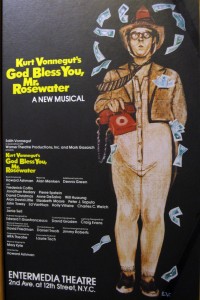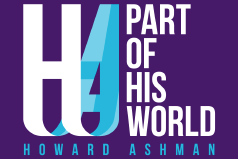God Bless You, Mr. Rosewater
The world of publishing is almost as rocky as the world of theater. And the world of e-publishing may well be the rockiest of all. Which is why you are reading the following essay here. Written by Alan Menken, it is the forward to what was supposed to be an e-book compilation containing both Kurt Vonnegut's God Bless You, Mr. Rosewater and Howard Ashman's book for the musical of the same name (for which he also wrote the lyrics). The powers of e-publishing decided against the larger project but here's the essay - with lots of insight into the early partnership of Ashman and Menken: "1978 was a pivotal turning point in my life and my career.
"1978 was a pivotal turning point in my life and my career.
When the year started I was exclusively writing both music and lyrics on projects that I was developing through the BMI Musical Theater Workshop; projects like Midnight (based on the 1939 film directed by Billy Wilder) and Harry the Rat with Women (an adaptation of the novella by Jules Feiffer). My special material had been featured in various revues and cabaret acts. I was accompanying club acts, working on jingles, writing songs for Sesame Street, performing as a singer/songwriter, demo-ing pop songs and dreaming of the day when I would have something to show for all of this work.
Then came Howard Ashman and God Bless You Mr. Rosewater. And nothing was ever the same again. Through my door came a project, a book writer, a lyricist, a director, a theater and the one of the greatest artistic voices of our generation, all in one. I found that all of the skills I had developed as a songwriter, arranger and musical theater dramatist were given full flower in this new partnership. In what seemed like the blink of an eye, we had the first draft of a new musical, ready to go into rehearsal in the spring of ’79.
The WPA Theater, where Howard was artistic director, was at 19th Street and Broadway, 3 floors up, just above the Chop Stix Massage Parlor. On one floor, there was a 99-seat theater, a rehearsal space, a tiny crowded office where Kyle Renick functioned as managing director and an even tinier cramped alcove where Howard had his combination office, storage bin and overnight accommodations. Howard, Kyle and the resident set designer, Edward T. Gianfrancesco (Hawk) had been friends for a while and this little theater had been their dream. And that dream eventually gave birth to such successes as Gorey Stories, Steel Magnolias, Key Exchange and of course, Little Shop of Horrors. When asked what “WPA” stands for, the stock answer was “We’ll Produce Anything”.
This story of the eccentric, compassionate and idealistic heir to the Rosewater fortune and his inevitable desire to spread the wealth among the poor, pathetic, abused denizens of Rosewater County, Indiana, found a perfect fit in Howard and the WPA. We found an actor who will always be Eliot Rosewater for me, Fred Coffin. Years later, when I’d see Fred playing the corrupt cop or the bully in some film or TV production, I would yearn to return him to this kind of role, where his great, larger-than-life heart belonged. I assembled my first music team; turning first to my longtime orchestrator, Danny Troob, who then introduced me to my first musical director, David Friedman.
The only kind of production we could mount was something called an Equity Showcase, in which actors took almost no salary at all in order to be guaranteed being reviewed. What that meant is that it was pretty much sink-or-swim for this musical, based on what the critics thought. Two weeks of performances and you either end there or get the notices you need to raise additional funds.
We didn’t end there. The critics liked us. And more importantly, Kurt Vonnegut liked us. One day, during our rehearsal period, on a warm spring day in April, he paid us a surprise visit. He quietly watched from the side of the room. And then he smiled, waved and gave a little dance step as he left. The torch had been passed; a small step for Vonnegut, and a giant step for Ashman and Menken.
Rosewater never had a long run. There never was an original cast album. It was too large for Off-Broadway and too intimate, counter-culture and quirky for the Broadway of 1979. Howard is gone, as is Kurt and Fred and the WPA Theater. But that time will always remain as vital to me as if it was yesterday. New York has changed. Off-Broadway has changed. But somehow the story of Eliot Rosewater and his journey to Rosewater County, Indiana and the heartland of America, all told through the eyes of Kurt Vonnegut and Howard Ashman, remains relevant and important." - Alan Menken
